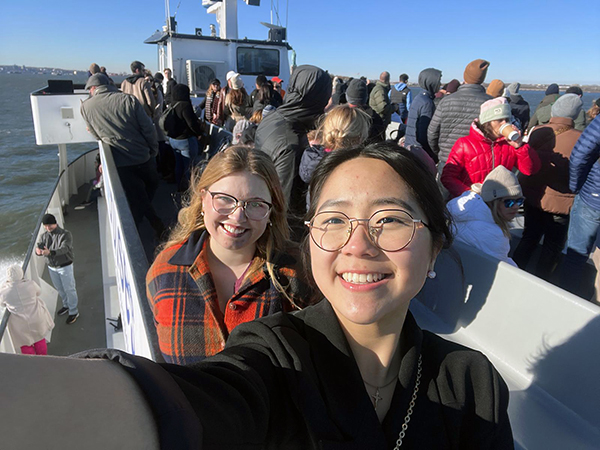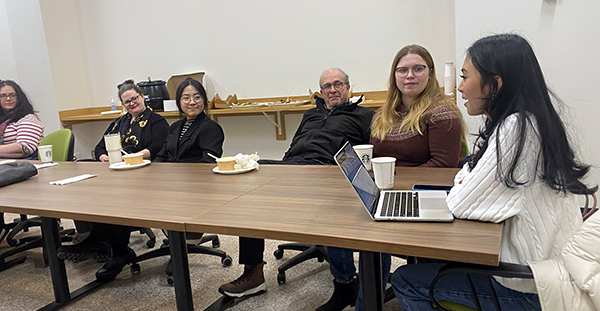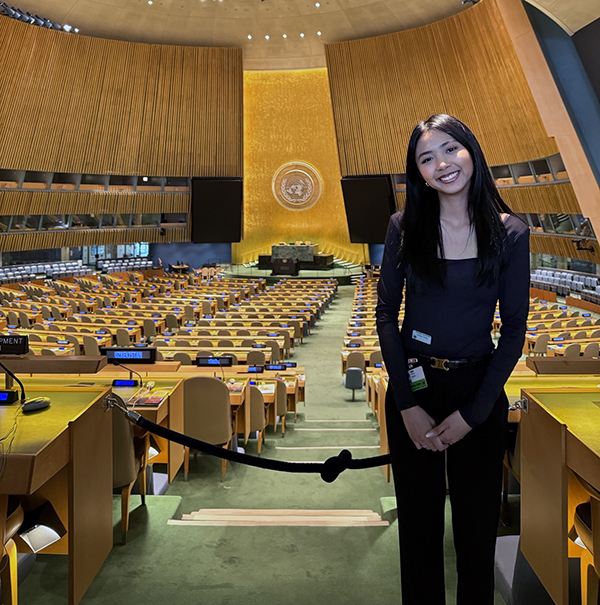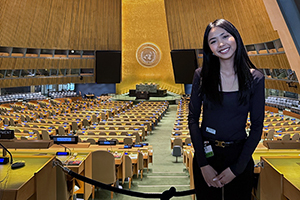
Despite failings, UN remains beacon of hope, say STM students
Advocacy seminar in New York demonstrates 'making little waves will make bigger ones' in quest for peace
By Paul SinkewiczFive students from St. Thomas More College (STM) gained a new view of the world in November on a whirlwind trip to New York City.
Taking a bite out of the Big Apple included looking down on the city from the top of the Empire State Building, visiting Times Square at midnight and taking in a show at Carnegie Hall. Along the way they dodged fearless pigeons, imbibed smells best left uncatalogued, saw seeming inexhaustible supplies of trash, and spied Manhattan’s famous rats.
But their most eye-opening new perspective had nothing to do with the touristy stuff or the blighted underbelly of the big city. They got a chance to meet some of the most dedicated public servants in the world and came away with a powerful emotion -- hope.
The group heard from ambassadors and delegates from countries near and far who were fighting for human rights, promoting development, and lobbying against wars – often in the face of daunting obstacles.
The quintet took part in a joint project between STM College and Mennonite Central Committee (MCC) that gives students the opportunity to visit New York City to visit the United Nations.
“MCC traditionally puts on two advocacy seminars each year – one in Ottawa and one in New York – that are focused on advocacy and the work that can happen at those higher levels to address the root causes that we see when we’re working in the field,” said Heather Peters, MCC Saskatchewan Peacebuilding Coordinator.
About 40 post-secondary students from Canada and the United States gathered at the MCC office at United Nations Plaza for three days in November to learn more about the behind-the-scenes workings of the UN.
The theme of the 2024 trip was Peacebuilding: Does the UN Matter? The students engaged with diplomats, lobbyists, international experts, and each other to consider the question.
Ambassadors and delegates talked about their work and engaged the youth in conversations about peace building, including Ambassador Caroline Rodrigues-Birkett, Permanent Representative of Guyana to the United Nations, and U.S. diplomat Faith Kroeker-Maus. Both had a huge impact on the group.
“There were a lot of amazing people,” said second-year STM student Paula Orata. “All of them together created a very well-rounded perspective of what the UN does in terms of politics and religion.”
Christine Kwon, a fourth-year health studies student, said getting a chance to see the inner workings of the UN, she was able to discern the imbalances in influence and power that are in play even within the UN, especially when veto power is used at the UN Security Council by any of the five permanent members.
“But there are great things happening,” Kwon said.
She added that Rodrigues-Birkett gave her great hope because she showed there are great people working within the system working hard to address major issues and that the UN does matter because – frustrations aside – it’s important to have a collective voice for all the nations and a place to have an assembly where countries can sit and talk about issues.
She said critical outcomes can come from small beginnings.
“For myself, I was really exposed to the world of policy making in public health and shifted my career trajectory, in a sense, that public health is very important in creating peace,” said Kwon. “If all goes well, I might be considering taking a master’s in public health.”
Aidan Twidale, a fourth-year psychology student, was also deeply affected by the trip. Next year she plans to add peace studies to her schedule thanks to her increased awareness and growing interest in world affairs.
“I found that throughout the seminar a lot of the issues we talked about were due to the imbalance in the Security Council and the veto powers,” Twidale said. “We did discuss quite a bit about what possible solutions there could be, but it sounds like there’s not going to be any action to adjust it for a while.”
Orata said it is very frustrating to hear about the dysfunction of the UN Security Council.
“People see the UN as an organization that is not delivering on its promise as it should because conflicts aren’t being resolved, like Ukraine and Russia and Israel and Palestine,” said Orata.
She also said the UN so often fails smaller nations that depend upon it for their voice in the world, and noted Africa, with 54 nations, has no permanent seat on the Security Council.
But Orata said the trip taught her the UN is much more than just the Security Council. The UN Economic and Social Council deals with economic, social, cultural and health matters as well as human rights and fundamental freedoms.
Orata took to heart the call to keep discussions about peace and international security and the fight for humanitarian rights going when the seminar participants returned to their home university.
“Making little waves will make bigger ones,” she said. “Personally, going through undergrad my goal was always to go into law school and become a lawyer, and my major right now is business/econ, but I’m thinking about changing it to political studies, so next semester all of my classes are political studies, so that’s a change that I’ve made and I’ve very happy about it.”
Anyone interested in finding out about future opportunities to take part in MCC seminars is invited to get in touch with Caitlin Ward, Manager of Engaged Learning at STM, at cward@stmcollege.ca.
Engaged Learning at STM College:
https://stmcollege.ca/study-here/engaged-learning-and-study-abroad.php
What is MCC?
MCC is a global, nonprofit organization that strives to share God’s love and compassion for all through relief, development and peacebuilding.
MCC was formed in 1920 to provide food for families suffering from famine and disease in southern Russia (present-day Ukraine) and soon expanded its mission. Over 100 years later, it is still working for relief, development and peace all over the world.
Whether assisting displaced families, helping farmers or teaching conflict transformation, MCC empowers communities to meet local needs and build peace.
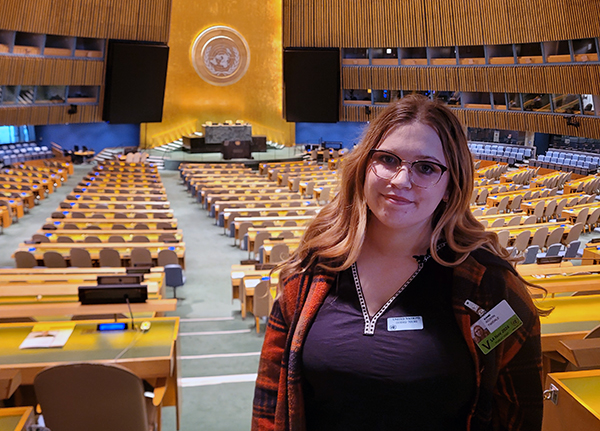
The United Nations Secretariat Building is a skyscraper at the headquarters of the United Nations in New York City.

